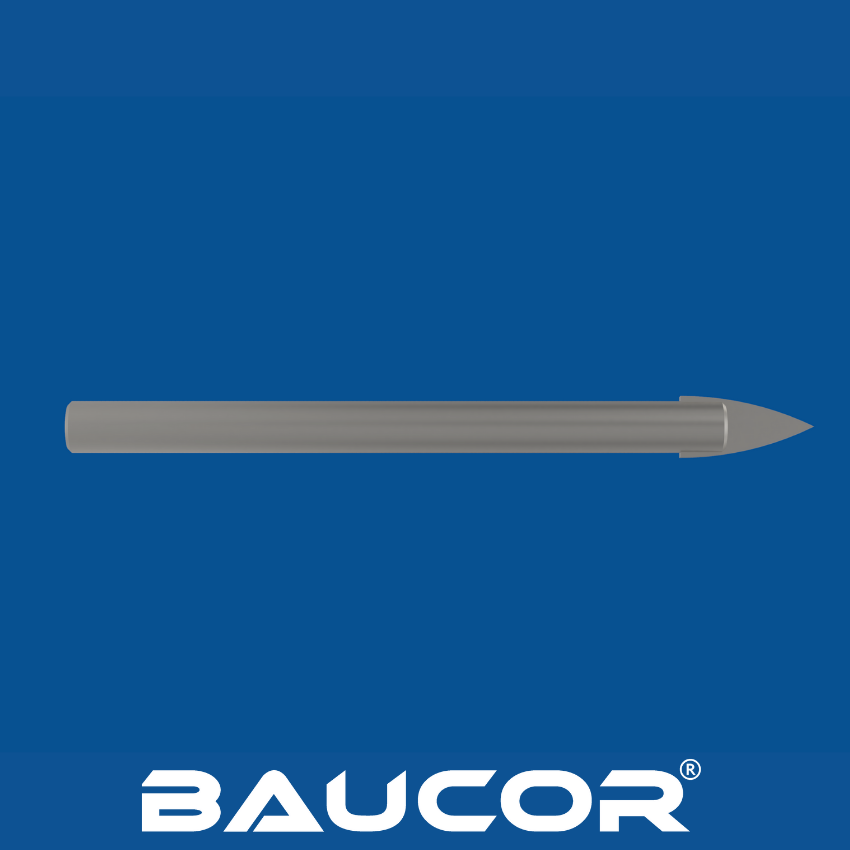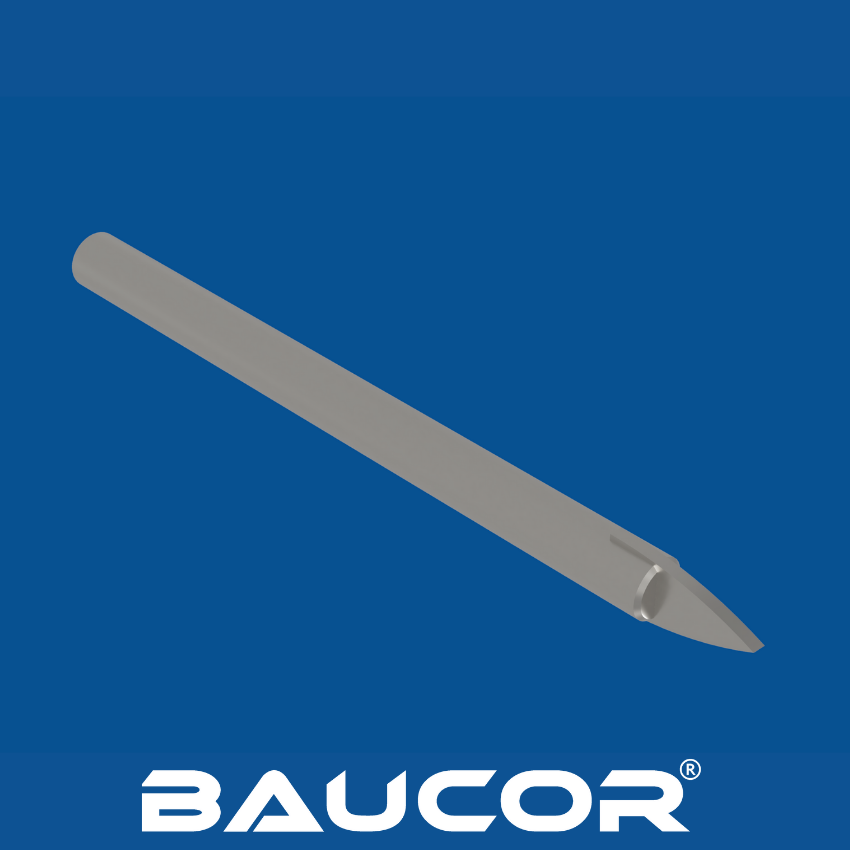CONQUER ANY MATERIAL WITH BAUCOR:
THE DRILL BITS BUILT FOR UNSTOPPABLE PERFORMANCE.
CONQUER ANY MATERIAL WITH BAUCOR:
THE DRILL BITS BUILT FOR UNSTOPPABLE PERFORMANCE.
What is a Glass and Tile Drill Bit?
Glass and tile drill bits are specialized tools designed to drill through hard, brittle materials like:
Other Brittle Materials: Can sometimes be used on materials like sea shells or fiberglass.
How Glass and Tile Drill Bits work?
Lubricant: Reduces friction and prevents overheating.
Chip Removal: Helps flush away the fine glass or tile powder.

Raw Materials:
Key Manufacturing Steps:
Shank Formation: The steel shank is shaped to the desired form, including creating the portion that will fit into a drill's chuck.
Carbide Tip Formation:
Powder Preparation: Tungsten carbide powder is mixed with a binder (often cobalt) to improve adhesion and toughness.

3. Brazing: The carbide tip is carefully brazed (joined using a filler metal) onto the steel shank. This process requires precise heat control to ensure a strong bond.
4. Grinding: The carbide tip is ground to its final spear-point shape with specialized diamond grinding wheels. The cutting edges are also ground to achieve the desired width and profile.
5. Quality Control: The finished bit undergoes inspection to ensure dimensional accuracy, sharpness, and the absence of defects.
Additional Considerations

A straight flute drill is a type of drill bit characterized by its straight cutting edges (flutes) that run parallel to the drill's axis. This design is particularly well-suited for drilling materials that produce short chips.

Stub length drill bits are shorter versions of standard jobber length drills. This design prioritizes rigidity and precision.

Taper shank drills are specialized tools designed for heavy-duty drilling applications. They feature a tapered shank that provides a secure, self-tightening fit in compatible machine spindles or tools.

An auger drill bit is a spiral-shaped drill bit designed for boring holes into wood, soil, and sometimes even ice. Its design resembles a large screw, making it highly efficient at clearing out chips and debris as it drills.
When it comes to glass and tile drill bits, Baucor is your one-stop shop for finding the perfect size to match any project requirement.
Common Size Ranges
Small Diameters:
Standard Sizes:
Popular sizes include 1/4", 5/16", 3/8", 1/2", 5/8", and 3/4" for most projects.
Specialty Sizes
Baucor can manufacture drill bits for you ranging from very small sizes like 0.05 mm to large sizes up to 180 mm, accommodating a wide spectrum of drilling requirements.
Please contact us for the appropriate dimensions. Baucor can produce drill bits in the most specialized sizes tailored to your needs.

Center drills are specialized tools designed primarily for creating precise center holes (or starting holes) in workpieces. These center holes serve as accurate guides for subsequent drilling, tapping, or machining operations.

A counterbore drill bit is a specialized tool designed to create a flat-bottomed, cylindrical enlargement at the top of a pre-drilled hole.

A countersink drill bit is a specialized tool designed to create a conical recess at the top of a pre-drilled hole. This recess allows screw heads or other fasteners to sit flush with or below the surface of the workpiece, providing a clean, professional finish.

Double margin drills, as the name suggests, incorporate an additional margin ground behind the leading margin.
Glass and Tile Drill Bit Materials: The Right Tool for Delicate Work - Baucor
Core Materials
Specialized Materials
Rare or Theoretical Materials
Do Coatings Enhance Glass and Tile Drill Bits? - Baucor Insights
Potential Coatings
Less Common, Specialized Coatings
Why Coatings Are Less Prevalent
The Importance of Quality and Technique
For glass and tile drill bits, prioritize the following:
Primary Areas of Use
Home Improvement and DIY: Essential for various projects around the house, including:
Construction and Remodeling: Employed by contractors and tile installers for:
Creating holes for shower doors and enclosures
Running plumbing or electrical lines through tile
Accommodating fixtures on tiled walls or floors
Arts and Crafts: Used by artists and hobbyists for working with:
Specific Examples
Why Glass and Tile Drill Bits Are Ideal
Glass and Tile Drill Bits: Essential Tools Across Industries
Primary Industries
Additional Industries with Notable Use
Why Glass and Tile Drill Bits Are Popular Across Industries
Powering Glass and Tile Drill Bits: The Right Machines for Delicate Work
Primary Machines
Important Considerations
Safety First

Reduced shank drills, also known as blacksmith's drills or silver and deming drills, are specialized tools designed to provide flexibility when working with different drill chucks or machine spindles.

Screw machine length drill bits, also known as stub-length drill bits, are shorter versions of standard jobber length drills.

A spade bit is a flat, paddle-shaped drill bit designed for boring large holes in wood. It features a sharp center point for precise positioning and two broad cutting edges for rapid material removal.

Spot drills are specialized cutting tools designed to create a precise conical indentation ("center") in a workpiece. This serves as a highly accurate starting point for subsequent drilling operations, ensuring the drill bit doesn't wander and ensuring proper alignment.
At Baucor, we are more than just manufacturers of glass and tile drill bits. We are your dedicated partners in achieving successful and precise drilling in these challenging materials.
Selection Guidance
Best Practices & Techniques
Technical Support
At Baucor, we are committed to providing comprehensive support and expertise to ensure your success with glass and tile drill bits. Your projects are our priority.

BAUCOR offers custom manufacturing and engineering solutions tailored to your specific needs, across various industries.

BAUCOR's engineers can review your design and provide feedback to improve manufacturability, cost effectiveness, and efficiency.


Glass and Tile Drill Bit Design: Optimizing Performance for Delicate Materials - Baucor Guide
Key Design Elements
Spear-Point Tip:
Carbide or Diamond Tip:
Flattened Cutting Edges
Shank:
Typically made of steel for strength.
Must fit standard drill chucks.
Design Trade-offs
Choosing the Right Design for Your Needs